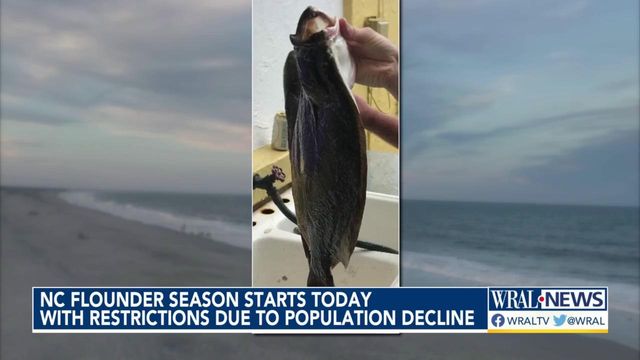One fish per day: Overfishing prompts limits on NC flounder
Overfishing has caused a reduction in the flounder population, leading the North Carolina Division of Marine Fisheries to impose management measures including limits to recreational fishing.
The state's recreational flounder season for gigging and hook-and-line fishing runs from Thursday to Sept. 30. The catch limit has been lowered to one fish per day with a minimum size of 15 inches. Last year, anglers could keep up to four fish per day. There was no closed flounder season until 2019.
"Flounder has been one of the most popular recreationally targeted species in North Carolina for generations and now [the state's] mismanagement has led us to the point where the public just doesn't have access," said David Sneed, executive director of the Coastal Conservation Association of North Carolina, an organization that says the chronic decline of the flounder population was caused by North Carolina's failure to prevent overharvesting, primarily by the commercial sector.
The state says the overfished status is a mixture of habitat issues, other environmental issues such as water quality, removals from the commercial and recreational fisheries, and a low amount of young fish entering the fishery.
“North Carolina’s southern flounder stock is part of a South Atlantic stock impacted by fishing effort in other states, and for the first time, we have evaluated the stock from this broader geographic range,” said Patricia Smith, a spokeswoman for the state Division of Marine Fisheries. “The [new] management measures … are the most stringent management measures ever implemented for southern flounder in North Carolina.”
About 70% of this year's projected total harvest is allocated to commercial, for-profit fishing, according to the DMF. The remaining 30% is for recreational anglers, with total allowable landings of about 160,000 for the next three seasons. The allowable landings were the same last year, but the recreational fishery greatly exceeded that amount, according to DMF.
If the 2022 harvest exceeds the quota, it will be accounted for the following year by shortening the season. These accountability measures would be applied to both the commercial and recreational fisheries.
“The fishing public could very well see their ability to harvest flounder even more severely restricted next year and years to come, even to the point where there could be no recreational fishing season at all," Sneed said.
A group of 86 citizen plaintiffs and Sneed’s group filed a lawsuit in 2020 against the state, claiming it was responsible for "perpetuating the long-running, ongoing decline of the North Carolina's coastal fisheries." That case is awaiting a decision from the North Carolina Court of Appeals on the state's request for sovereign immunity from the lawsuit.
"We in the conservation community have been asking the state to do something about the declines in this stock," Sneed said. "Otherwise, we're not going to have any sort of legacy left for our future generations to enjoy."
The South Atlantic Southern Flounder Stock Assessment, an assessment of multistate data conducted by the DMF, found that southern flounder is overfished in the region that includes North Carolina through the eastern coast of Florida.
DMF discourages anglers from targeting flounder for catch-and-release after reaching the one-fish limit or when the season is closed.
The division is collecting flounder carcasses for future stock assessments during the recreational flounder season. There are eight temporary DMF freezer locations, in addition to the ten collection locations available throughout the year, where anglers can donate carcasses.
2022 temporary locations:
- Oden’s Dock: 57878 North Carolina Hwy 12, Hatteras
- Bridge Tender Marina: 1418 Airlie Rd, Wilmington
- NC Division of Marine Fisheries: 943 Washington Square Mall Highway 17, Washington
- Sea Gate Marina: 729 Sea Gate Dr, Newport
- Chasin’ Tails Outdoors: 709 Atlantic Beach Causeway, Atlantic Beach
- Ocean Isle Marina: 2000 Sommersett Rd SW, Ocean Isle Beach
- Seapath Yacht Club: 330 Causeway Dr, Wrightsville Beach
- Dudley’s Marina: 106 Cedar Point Blvd #8000, Cedar Point
Year-round locations:
- Cape Pointe Marina, Harkers Island
- Frisco Rod & Gun, Frisco
- Jennette’s Pier, Nags Head
- Pogies Fishing & Kayaking Center, Swansboro
- Pelagic Hunter Fishing Center, Sneads Ferry
- Sea View Crab Company, Wilmington
- Tex’s Tackle, Wilmington
- NC Division of Marine Fisheries Headquarters, Morehead City
- NC Division of Marine Fisheries, Wilmington
- Marine Corps Air Station Cherry Point- Environmental Affairs Office (available only to those with military base access)
Anglers who donate legal carcasses and provide a completed carcass collection catch card will be eligible for either an Angler Recognition Certificate (one per season for fish 15 inches to less than 24 inches total length) or a N.C. Saltwater Fishing Tournament Citation (one per fish for fish 24 inches or greater total length).
When cleaning the fish, anglers should leave the head and tail intact and, if possible, leave the guts in the fish, the state says. Anglers who fished on a charter boat or head boat should let the fish cleaner know the carcass will be donated.
The state asks anglers to give information related to how and when the fish was caught and will require them to provide their names and addresses if they want to receive a certificate or citation.
Division biologists will measure the fish, determine the sex, if possible, and remove the ear bones to determine the age of the fish. The information collected will be used in future flounder stock assessments, according to DMF.











